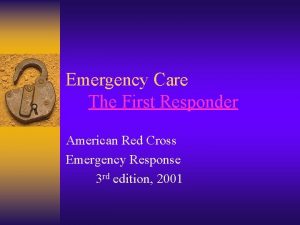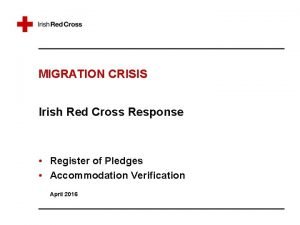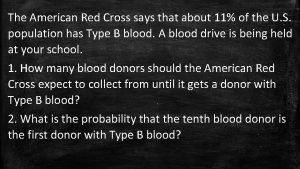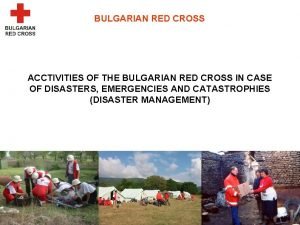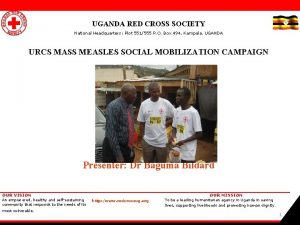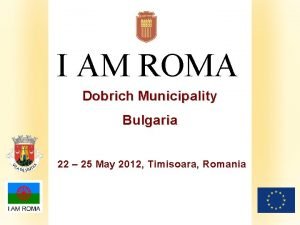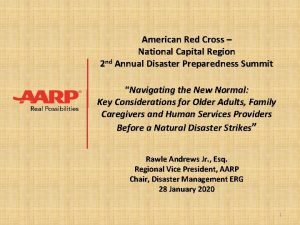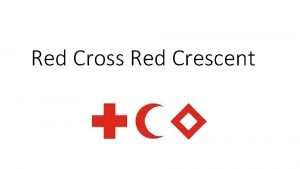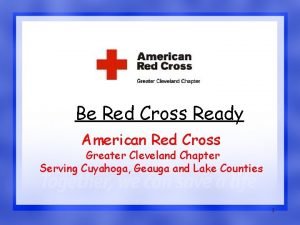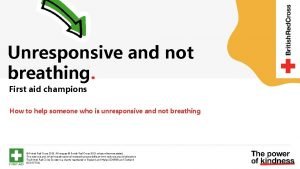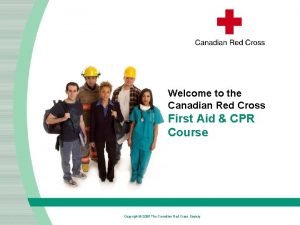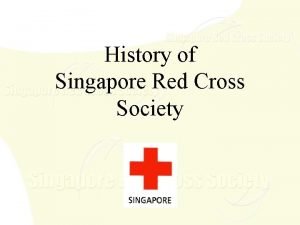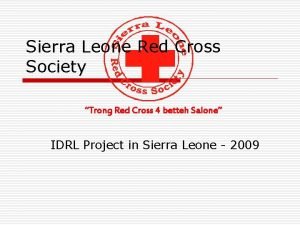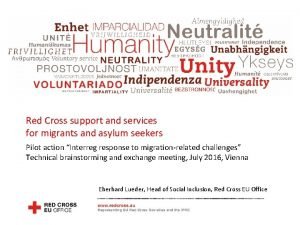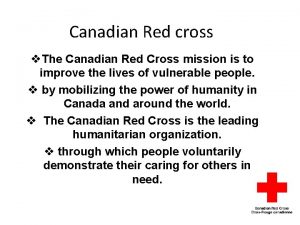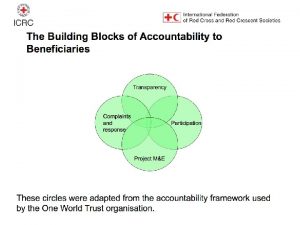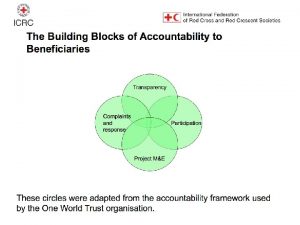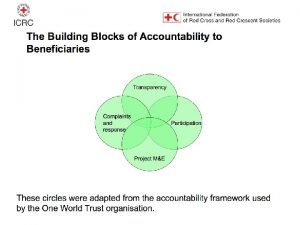Experiences of the Russian Red Cross in Providing





















- Slides: 21

Experiences of the Russian Red Cross in Providing Medical/Psychological Assistance to HIV+ women and Children born to HIV+ mothers Irkutsk City (East Siberia) Russian Federation


Facts about the HIV/AIDS Epidemic in the Russian Federation • Russia has the biggest AIDS epidemic in all of Europe • Approximately 350, 000 HIV cases have been ‘officially’ registered in the Russian Federation (Russian AIDS Centre, 2005) • Actual number of total infections is believed to be over 860, 000 (UNAIDS, 2004) • Young injecting drug users are fueling the epidemic (340, 000 IDUs registered in 2004)

The HIV/AIDS Epidemic in Irkutsk Region (East Siberia) Dramatic increase in HIV: • 4, 500 cases in 2000 • 20, 000 cases in 2005 Rapidly changing dynamic: • In 2000, the epidemic was fueled almost entirely by IDUs • Today, 50% of all cases are among women who were infected through heterosexual transmission More than 2, 000 children born to HIV+ mothers since 1999

“The Care & Support Project for PLWHA” Project Goal: Improved quality of life for PLWHA, including HIV+ pregnant women and children born to HIV+ mothers Target beneficiaries: PLWHA, including HIV+ pregnant women and children born to HIV+ mothers Start date: February 2003 Donor: Private Funding by U. S. -based Foundation, in partnership with the American Red Cross

Project Goals and Objectives Objective 1: Improve healthy behavior and disease management skills for PLWHA Objective 2: Decrease experiences of fear or stigma reported by PLWHA (from themselves, healthcare workers, family and friends) Objective 3: Reduce risk of mother-to-child transmission (MTCT) of HIV Objective 4: Improve psychological and physical development of children (0 -6 years old) born to HIV+ mothers

Objective 3: Reduced Risk of Mother to Child Transmission (MTCT) of HIV Interventions/Activities • Providing home visits and counseling to HIV+ pregnant women and new mothers • Partnership with AIDS Center on referral system • Monitoring adherence to ARV therapy in coordination with the AIDS Center

Objective 4: Improve the physical and physical development of children born to HIV+ mothers Interventions/Activities • Distribution of food parcels and vitamins to families • Psychological support for children born to HIV+ women • ‘Stigma and discrimination’ trainings for teachers and health workers

Program Strategies Information and Counseling Center (ICC “Steps”) • HIV/AIDS Information and Counseling Center (ICC “Steps”) • HIV/AIDS Hot Line • Peer support group for PLWHA (first of its kind in Irkutsk)

Program Strategies Information and Counseling Center (ICC “Steps”)

Program Strategies Visiting Nurse (VN) service of the Russian Red Cross • The VN service of the Russian Red Cross was established 60 years ago • During the Soviet times, the VNs provided care for vulnerable populations, particularly elderly populations • Post-Soviet Union, the range of services provided by VNs has grown to include care for vulnerable children, TB patients, and PLWHA

Program Strategies Visiting Nurses & HIV programming Activities/Interventions • Regular monthly screening visits to vulnerable families with children born to HIV+ mothers, coordinated with the AIDS Center • Counseling of parents about prenatal prevention of HIV infection, nutrition and, adherence to ARV therapy • Monitoring of mental/physical development of children born to HIV+ mothers

Program Strategies Visiting Nurses & Home-based care Activities/Interventions: • Psychological support to HIV+ pregnant women and young mothers with the purpose of preventing social abandonment of children • Delivering food packages to children and ensuring the intake of essential vitamin supplements • Training for health workers on home -based care in coordination with the Pediatric services of the AIDS Center

Manual on Care & Support of PLWHA: for Visiting Nurses and Caregivers • Epidemiology of HIV • AIDS-related diseases • Nutrition • Treatment • PMTCT • HIV prevention among caregivers • Psychological needs of PLWHA • Legal and human rights of PLWHA

Manual on Children and HIV Infection: for Teachers, Psychologists, and Social Workers • Social/psychological needs of PLWHA and their family members • Needs of children affected by HIV infection • HIV prevention • Prevention of social abandonment of children born to HIV+ mothers • Promotion of legal rights and integration of HIV affected orphans

Program Strategies Partnerships with Local/Regional Government Ministry of Health (Mo. H) AIDS Center: • Coordination of home visits to affected families • Joint training for health workers on needs of PLWHA • Sharing of data and M&E reports Hospitals/Health Clinics • Information dissemination and education • Referral system for clients

Key Program Results 92% of pregnant women participating in the project stated that they are taking better care of themselves 84% of young mothers started visiting AIDS doctors regularly and became for conscientious about taking ART 98% of project beneficiaries stated that their knowledge of HIV improved

Best Practices and Lessons Learned • Strong partnership and coordination with local authorities, including the AIDS Center • Greater involvement of PLWHA into project activities • Prevention of ‘stigma and discrimination’ among health care workers • First of its kind peer support services and counseling led by PLWHA

Partners & Collaborators • American Red Cross (ARC) • International Federation of Red Cross and Red Crescent Societies (IFRC) • Pact’s Community REACH • US Agency for International Development (USAID) • International Research and Education Exchange (IREX) • UNICEF • Pfizer (USA) • All-Russian Network of Harm Reduction (Russia) … and many more!

In Loving Memory of Margaret Ann Cargill (1921 - 2006)

Thank you for your time! For more information please contact : Dr. Anna Zagaynova Russian Red Cross/Irkutsk Oblast 664011 Irkutsk 35 B Sverdlova Street Telephone/fax: +7 (3952) 344 -158 +7 (3952) 200 -393 Email: hivirk@ mail. ru www. redcross. irk. ru Mr. Ramine Bahrambegi, Health Delegate American Red Cross Moscow, 117036, Russia 5 Cheriomushkinsky Proezd, Tel/Fax: +8 (495) 937 -5267/5263 Mobile: +8 (916) 921 -5443 Email: ramine. bahrambegi@ifrc. org
 In the cross, in the cross be my glory ever
In the cross, in the cross be my glory ever Test cross and back cross with example
Test cross and back cross with example Condylar guidance
Condylar guidance Inconplete dominance
Inconplete dominance Monohybrid dihybrid difference
Monohybrid dihybrid difference Test cross and back cross
Test cross and back cross American red cross first responder
American red cross first responder International red cross mission statement
International red cross mission statement Irish red cross register of pledges
Irish red cross register of pledges British red cross strategy 2030
British red cross strategy 2030 The american red cross says that about 11%
The american red cross says that about 11% Red cross dobrich
Red cross dobrich American red cross bls pre assessment answers lesson 3
American red cross bls pre assessment answers lesson 3 Uganda red cross society headquarters kampala
Uganda red cross society headquarters kampala Red cross dobrich
Red cross dobrich Red cross national capital region
Red cross national capital region Red cross objectives
Red cross objectives Whale tales red cross
Whale tales red cross Red cross greater ny
Red cross greater ny First aid champions red cross
First aid champions red cross Secondary survey sample
Secondary survey sample Red cross society objectives
Red cross society objectives






